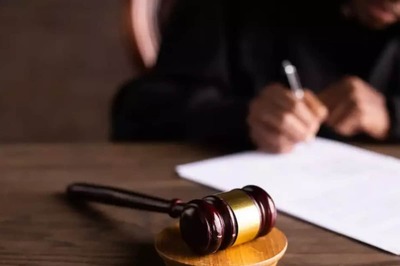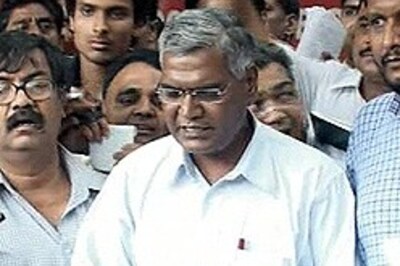
views
New Delhi: India on Thursday criticised Pakistan for its continuous support to terror organisations and refusal to acknowledge the Pulwama incident as a terror attack. The statement, not a new one in terms of messaging, came more than 40 days after the attack and a day after Pakistan said it had handed over a report on its preliminary investigation into the incident to Indian High Commissioner Ajay Bisaria. The investigation, as per Pakistan, yielded no evidence of the presence of terror outfits on its soil.
Since the attack on February 14, which killed over 40 CRPF men in Pulwama, India and Pakistan have sparred repeatedly, with both the sides contesting each other’s claims over what really happened and who was responsible.
The Stand-off
Five days after Pulwama, Pakistan Prime Minister Imran Khan asked for proof from India of his country’s involvement in the dastardly attack. Countering India’s allegations, Khan said the attack was carried out by a Kashmiri. He also threatened to retaliate if India acted militarily.
On February 26, the Indian Air Force crossed the Line of Control and dropped bombs on Balakot, with the Indian government saying the damage to a Jaish-e-Mohammed training camp was significant. Media reports put the number of terrorists killed in the attack between 300 and 350. Within 24 hours of Balakot, however, Pakistan conducted an air strike in Jammu & Kashmir though both countries said no damage was done. However, in the dogfight, IAF pilot Wing Commander Abhinandan was captured by Pakistan. He was released on March 1 with Khan terming it the first step towards the peace process.
The Dossier
Other than the show of strength that both the countries displayed, they were also engaging diplomatically. India handed over the Pulwama dossier to Pakistan’s acting high commissioner Syed Haider Shah on February 27. Soon after that, Pakistan claimed that it set up an investigating team to look into the attack. The Pakistan Foreign Office, on March 28, said the dossier contained names of around 90 individuals of which one-third were repetitions. The foreign office spokesperson also said India shared phone numbers but Pakistan found no linkage of those to the incident.
Pakistan also claimed that the dossier does not mention any link of Jaish-e-Mohammed chief Masood Azhar with the Pulwama incident. The Pakistan government said the dossier contained 91 pages and six parts of which only part 2 and 3 were related to Pulwama. “Other parts are generalised allegations. Pakistan is focusing on those parts which relate to Pulwama incident,” the Pakistan foreign office said. India has officially not given out exact details of the dossier it shared with Pakistan.
The Preliminary Investigation Report
Pakistan, on March 27, said it had shared a report with India on its preliminary investigations into the Pulwama attack, most of it based on what India had given in the dossier. “During the course of investigations, all aspects of the information provided by India have been thoroughly examined, including the "confessional" video of Adil Dar, "claim" of responsibility for the attack, WhatsApp and Telegram numbers used to share videos and messages in support of Pulwama attack, list of 90 individuals suspected of belonging to a proscribed organisation and 22 pin locations of alleged training camps,” the Pakistan foreign office said. It also added that service providers had been asked for relevant data and a request for assistance from WhatsApp had also been made to the US government. News18 reached out to the US administration but received no comment on the same.
Pakistan also said 54 Pakistanis were identified from the dossier and were being investigated. “The remaining Pakistanis mentioned in the Indian paper could not be identified as there are no details, like CNIC number, mobile number, residential address etc. It is hard to find a person only with a name. 54 Pakistanis were identified who are being investigated. No links connecting them to Pulwama have been found,” Pakistan foreign office spokesperson said, adding that it needed additional information from India to continue the investigation.
Reacting to the response, the Ministry of External Affairs said India was disappointed at Pakistan’s detailed dossier on the Jaish-e-Mohammed’s complicity in Pulwama, the presence of its terror camps and leadership in Pakistan. “It has not shared details of credible action, if any, taken by it against terrorists or terrorist organizations based in territories under its control. We are hardly surprised, as this identical script was followed by Pakistan in the past, after the terror attacks in Mumbai in 2008 or in Pathankot in 2016,” India said.
Masood Azhar
In the days after Pulwama, there was one man who held the world’s attention — Jaish-e-Mohammed chief Masood Azhar. Earlier this month, US, France and Britain moved a resolution to list Azhar as a terrorist under the UN’s 1267 Sanctions Committee. While his organisation is listed as a terror outfit, Azhar is yet to be designated.
This was not the first time that the committee had sat down to vote on Azhar’s designation. But like all times, this time too, China exercised its veto and put a technical hold on the designation. China has maintained that it needs more proof to do the same.
While Pakistan has said it does not support terror, Pakistan foreign minister Shah Mahmood Qureshi, in an interview earlier this month, said his government was in touch with Azhar and he was “unwell.” Soon, reports started doing the rounds about Azhar’s death. The Jaish chief, however, quashed all such rumours. Azhar reportedly released an audio which claimed that he was alive. The audio also mentioned that he had nothing to do with the Pulwama attack.
The US, however, on March 29 moved a draft resolution in the UN Security Council to blacklist Azhar. While China can still put a hold on it, this time around it will have to make it public why it’s doing so.

















Comments
0 comment